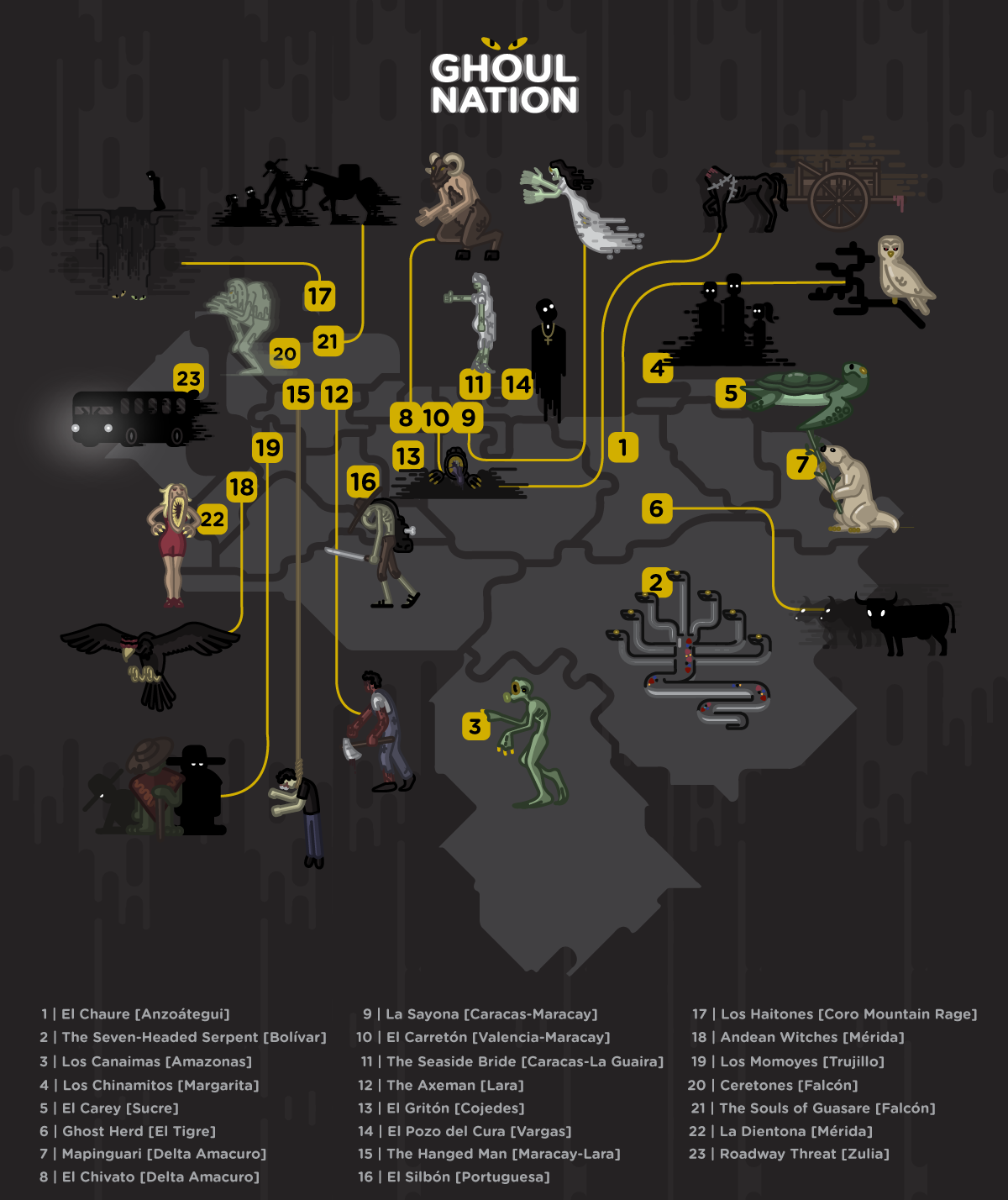Ghoul Nation Part IV: Everything You Wanted to Know About Venezuelan Folk Monsters, But Were Afraid to Ask
Each of the Venezuelan States has its own specific set of idiosyncrasies, their own very distinct way of communicating, eating, living and handling their affairs. Particular ghosts, monsters and creatures roam each region, as an army of dead that remind us of the violence, misery and dispair within each community.


Art: ModoGrafico
In the Venezuelan countryside, we grow up understanding that life is filled with unavoidable warnings about what we can’t explain, the dark and ominous things that seem to stalk us from the depth of the rice fields. Don’t bathe in the river at night. Avoid playing cards till dawn. Don’t walk home alone during the Devil’s hour. Ignore strangers on the road. Don’t hunt tame animals after sundown. Beware if your cows graze late at night. Be careful with the burials that glow under the oldest trees. Keep your scapular on your chest and salt in your pockets. Remind your children when it’s too dark to play hide and seek. Close the windows, throw linseed up on the roof and keep the candles at hand because a storm is coming.
[Check out Ghoul Nation Part I: Haunted Rainforest. Because Nothing truly dies when you live in the jungle.]
We grow up understanding that life is filled with with unavoidable warnings about what we can’t explain.
I spent my childhood in a farm on the outskirts of Mérida where these mystical topics were common, because things such as death, evil or sexuality were utterly taboo. I also travelled for a couple of years through the roads of the country’s west and the more distant or forgotten a community was, the more cruel their reality was—permeated by the clashes between landowners, drug traffickers and paramilitaries—the more colorful and complex their spooks’ stories became. Those sinister presences—apologies to misery, disease and isolation—still find their way in the everyday of their inhabitants.
Through people’s superstition and imagination, ghosts and monsters become the materialization of the hard daily catharsis of Venezuelans: the tougher life is, the broader the folklore of the dead.
 Our ghosts remain as witnesses of the bitterness of a time when hope and future looked darker than night in the countryside.
Our ghosts remain as witnesses of the bitterness of a time when hope and future looked darker than night in the countryside.
A ghost is a hidden memory that feeds of tragic moments, on painful situations, reminding us of the debts that haven’t been truly settled. In his film “The Devil’s Backbone” Guillermo del Toro defines them as: “A terrible event damned to repeat itself over and over. An instant of pain perhaps. Something dead that seems to still be alive at times. A feeling suspended in time, like a blurry photograph, like an insect trapped in amber.” Therefore, it’s a memory that emerges beckoning to that which should’ve remained hidden but reveals itself again.
[Check out Ghoul Nation Part II: Inside the Wasteland, where the city’s borders life and death are indistinctly precarious, and survival comes with bitter and savage conditions.]
Spectres give life to lost stories, which aren’t in books nor arise from figures and dates.
Spectres give life to lost stories, which aren’t in books nor arise from figures and dates; a natural disaster or a serious accident, such as the one that took place in Vargas in the 90s or the Amuay explosion in 2012. These tragedies are usually told through numbers, so they don’t hurt or disturb; a homicide is a number in a police file or a headline in the newspaper, with no face or mourners. Spectres serve as channels for the pain of loss, they hold on to the reminiscence of the dark feeling that comes with it.
The survival of our culture as it faces the overwhelming socialist status-quo finds a hint of light in the way of our oral tradition. It is constantly being renewed and reinterpreted according to the circumstances. Our ghosts speak from the pain and despair, from the violence and hunger; they remain as witnesses of the bitterness of a time when hope and future looked darker than night in the countryside.
[Check out Ghoul Nation Part III: Forgotten West, where catholic devotion, open skies and darkness are three main traits of the most isolated region in Venezuela.]
Credits:
- Editor: Gabriela Mesones Rojo
- Design: Mario Dávila
- Text: David Parra
- Copy edit: Nina Rancel
- Supervision: Raúl Stolk
Caracas Chronicles is 100% reader-supported.
We’ve been able to hang on for 22 years in one of the craziest media landscapes in the world. We’ve seen different media outlets in Venezuela (and abroad) closing shop, something we’re looking to avoid at all costs. Your collaboration goes a long way in helping us weather the storm.
Donate




